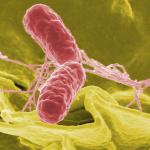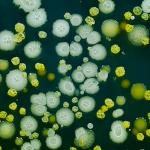Okay, most people don't want the words feces and food uttered in the same sentence.
bacteria
The sequence of an organism's genome, a staple in today's world of scientific experimentation, is as essential to scientific research as beakers.
Microbiologists often study microbes in isolation.
"Ew, what was that?" is perhaps the most common refrain uttered by people as they drive past roadkill. Most people find these carcasses repulsive, as they glide their cars carefully around the bloody remains.
Pest control and microbial disinfection protocols often utilize ultraviolet (UV) light. The reason is because UV light is extremely damaging to cells.
Classifying species is a notoriously sticky problem in biology.
With winter approaching, perhaps you or somebody you know will be unlucky enough to catch a nasty "stomach flu" or "24-hour flu," which will allow you to spend some quality time in the bathroom.
International travel is not always a pleasant experience. Cramped airplanes with crying babies, ridiculous and arbitrary regulations, long lines, and overpriced food contribute to the general grumpiness and anxiety that many travelers feel.
Roughly 1 in 3 women douche, but there is no good health reason to do so. Many women believe that douching will clean their vaginas or elim











